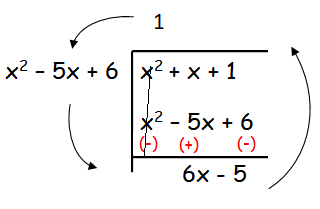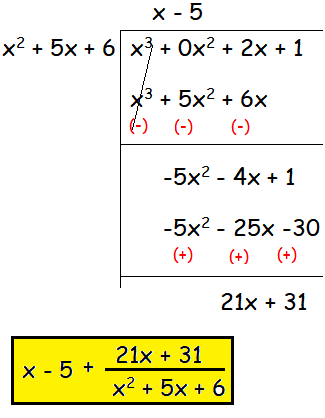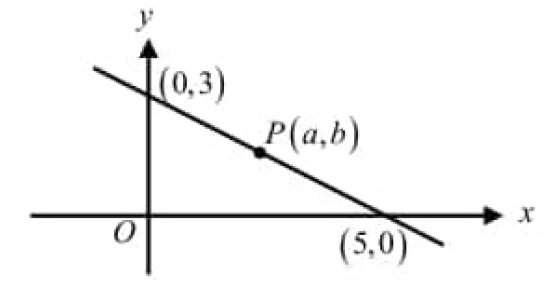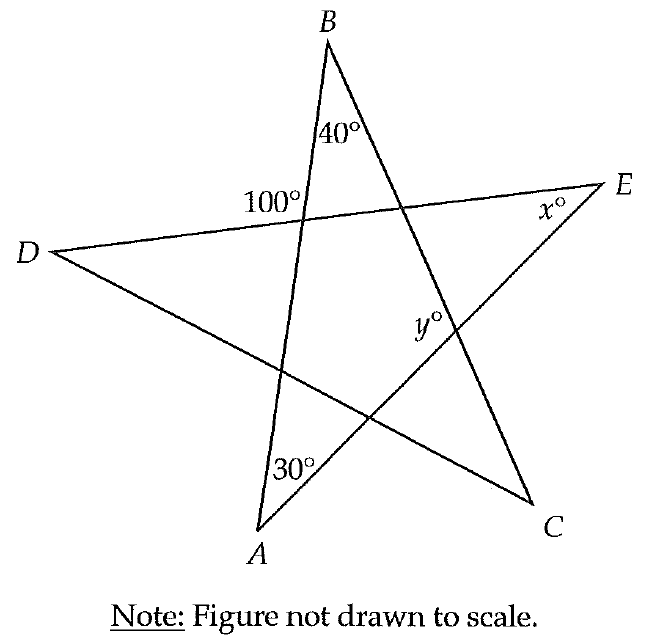PARTIAL FRACTIONS QUADRATIC NUMERATOR AND DENOMINATOR
Example 1 :
Resolve the following rational expression into partial fractions.
(x2 + x + 1)/(x2 - 5x + 6)
Solution :
Since we have same power for both numerator and denominator, we have use long division.

(x2 + x + 1)/(x2 - 5x + 6) = 1 + [(6x - 5)/(x2 - 5x + 6)]
(6x - 5)/(x2 - 5x + 6) = (6x - 5)/(x - 2) (x - 3)
(6x - 5)/(x - 2) (x - 3) = A/(x - 2) + B/(x - 3)
6x - 5 = A(x - 3) + B(x - 2)
|
If x = 2 12 - 5 = A(2 - 3) 7 = -A A = -7 |
If x = 3 18 - 5 = B(3 - 2) 13 = B B = 13 |
Hence the solution is

Example 2 :
Resolve the following rational expression into partial fractions.
(x3 + 2x + 1)/(x2 + 5x + 6)
Solution :
The denominator is having least power than numerator, then we have to used long division.

21x + 31/(x2 + 5x + 6) = 21x + 31/(x + 2)(x + 3)
(21x + 31)/(x2 + 5x + 6) = A/(x + 2) + B/(x + 3)
21x + 31 = A(x + 3) + B(x + 2)
|
If x = -3 -63 + 31 = B(-3 + 2) -32 = - B B = 32 |
If x = -2 -42 + 31 = A(-2 + 3) -11 = A A = -11 |
Hence the solution is

Example 3 :
Resolve the following rational expression into partial fractions.
(x + 12) / (x + 1)2 (x - 2)
Solution :
The denominator is having least power than numerator, then we have to used long division.

x + 12 = A(x + 1)(x - 2) + B(x - 2) + C(x + 1)2
x + 12 = A(x2 - x - 2) + B(x - 2) + C(x2 + 2x + 1)
x + 12 = (A + C)x2 + (-A + B + 2C)x + (-2A - 2B + C)
By equating the coefficients of x2, x and constant terms, we get
A + C = 0 ---(1)
-A + B + 2C = 1 ---(2)
-2A - 2B + C = 12 ---(3)
(2) ⋅ 2 + (3) ===>
-2A + 4C -2A + C = 2 + 12
-4A + 5C = 14 ---(4)
|
(1) ⋅ 4 + (4) --> 4A + 4C = 0 -4A + 5C = 14 ----------------- 9C = 14 C = 14/9 |
Applying the value of C in the 1st equation, we get A + (14/9) = 0 A = -14/9 By applying the value of A and C in the second equation. (14/9) + B + 2(14/9) = 1 B = 1 - (14/9) - (28/9) B = (9 - 14 - 28)/9 B = -33/9 B = -11/3 |
Hence the solution is

Kindly mail your feedback to v4formath@gmail.com
We always appreciate your feedback.
©All rights reserved. onlinemath4all.com
Recent Articles
-
Digital SAT Math Problems and Solutions (Part - 134)
Apr 02, 25 12:40 AM
Digital SAT Math Problems and Solutions (Part - 134) -
SAT Math Resources (Videos, Concepts, Worksheets and More)
Apr 02, 25 12:35 AM
SAT Math Resources (Videos, Concepts, Worksheets and More) -
Digital SAT Math Problems and Solutions (Part 135)
Apr 02, 25 12:32 AM
Digital SAT Math Problems and Solutions (Part 135)

